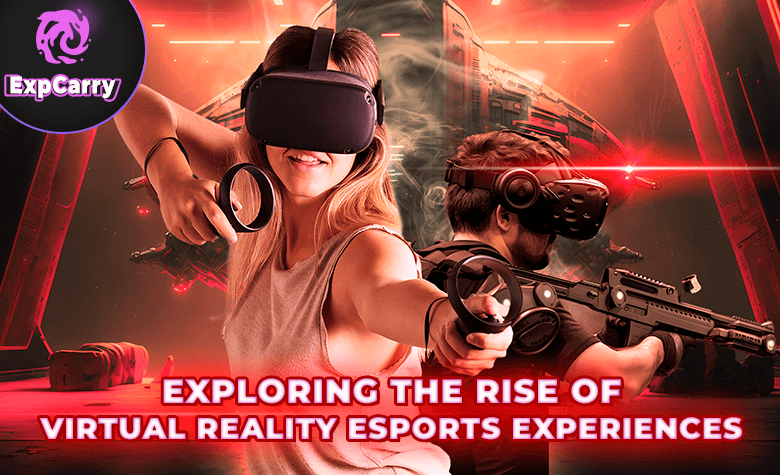Exploring the Rise of Virtual Reality Esports Experiences

In the fast-paced world of esports, where innovation reigns supreme, the integration of virtual reality (VR) technology has sparked a new era of excitement and possibility. Picture this: you don a headset, and suddenly, you're transported into the heart of a virtual arena, surrounded by the cheers of thousands of fans as you watch your favorite players battle it out in a digital realm. This is the future of competitive gaming, where reality and virtuality seamlessly converge to create an experience like no other. However, the future of not only eSports, but also related markets, such as betting with dota 2 bet and betting, is a topic of a separate conversation.
Over the past decade, virtual reality has transitioned from a niche curiosity to a mainstream phenomenon, finding its footing within the esports industry. What began as experimental prototypes and proof-of-concept demos has blossomed into a thriving ecosystem of VR esports leagues, tournaments, and spectator platforms. In 2024, we find ourselves at the forefront of this revolution, witnessing the transformative power of VR as it reshapes how we play, watch, and experience esports.
In this article, we'll embark on a journey through the evolution of virtual reality in esports, exploring its emergence, impact on spectator experiences and gameplay, as well as the challenges and opportunities it presents. Drawing from real-world examples, including some of the most anticipated tournaments in 2024, we'll uncover the ways in which VR is redefining the very essence of competitive gaming. So, strap on your headset and prepare to dive into the electrifying world of virtual reality esports.
The Emergence of Virtual Reality in Esports
Virtual reality technology has come a long way since its inception, evolving from experimental prototypes to mainstream adoption within the esports industry. The early days were marked by curiosity and experimentation, as developers and enthusiasts explored the potential of VR in gaming. Fast forward to 2024, and we find VR technology more accessible and refined than ever before. Esports organizations and developers are embracing VR's potential to revolutionize the gaming experience, from immersive spectator experiences to groundbreaking gameplay mechanics. With advancements in hardware and software, VR is poised to become an integral part of the esports ecosystem, offering new avenues for competition, entertainment, and engagement.
Immersive Spectator Experiences in VR Esports
One of the most captivating aspects of VR esports experiences is the level of immersion they offer spectators. Unlike traditional 2D broadcasts, VR allows fans to step inside the game, experiencing the action from within virtual arenas. Platforms like AltspaceVR and Bigscreen have hosted virtual esports events, where viewers can interact with each other and even meet professional players. Tournaments such as the Virtual Reality Gaming World Championship have demonstrated the potential of VR to attract a global audience, transcending geographical boundaries and bringing fans closer to the action than ever before. As VR esports spectator platforms continue to evolve, they have the potential to become hubs of community engagement, fostering connections between players and fans in ways previously thought impossible.
Virtual Reality Gameplay and Esports Competition
Beyond spectator experiences, VR is fundamentally changing the way esports competitions are played and experienced. In VR esports, players are no longer confined to traditional input devices but instead use their bodies to control the action. Titles like 'Onward' and 'Pavlov VR' have gained popularity for their immersive gameplay mechanics, requiring players to physically move and aim within virtual environments. Tournaments such as the VR Esports World Cup have showcased the skill and athleticism required to compete at the highest level in VR esports. With a wide range of genres and experiences available, from rhythm games to first-person shooters, VR is democratizing esports, making it more accessible and inclusive for players of all backgrounds and abilities.
Challenges and Opportunities in VR Esports
Despite its potential, VR esports still face significant challenges on the road to mainstream adoption. Technical barriers such as high hardware costs and motion sickness concerns can deter potential players and spectators. Moreover, the logistics of organizing VR esports events, from venue setup to technical support, present unique challenges for organizers. However, with the right investment and infrastructure, these challenges can be overcome. Initiatives like the VR Esports Initiative aim to promote collaboration and innovation within the VR esports community, driving growth and sustainability in the long term. Additionally, VR esports present exciting opportunities for revenue generation, from virtual merchandise sales to sponsorship opportunities. As the industry continues to evolve, it's essential for stakeholders to collaborate and invest in the future of VR esports, ensuring its success and longevity in the competitive gaming landscape.
Conclusion
The rise of virtual reality in esports represents a paradigm shift in the way we play, watch, and engage with competitive gaming. With immersive spectator experiences, innovative gameplay mechanics, and a host of new opportunities, VR has the potential to revolutionize the esports industry. As technology continues to advance and esports organizations adapt to the changing landscape, VR will undoubtedly play a central role in shaping the future of gaming. Whether you're a seasoned player, a casual fan, or simply curious about the future of esports, now is the time to embrace the virtual reality revolution and experience gaming like never before.